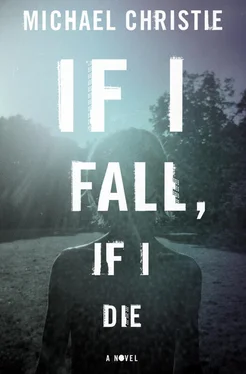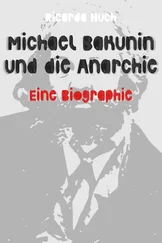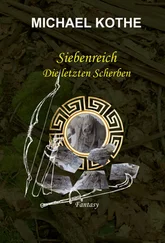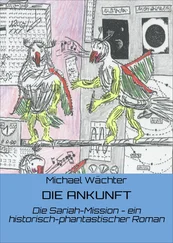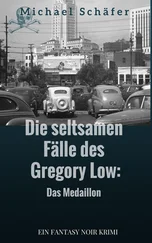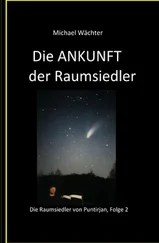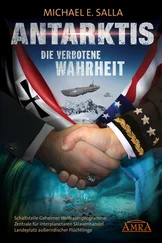But maybe there was still time, she thought, rising to kill the projector. Her panic was lessening each day. Who was to say it wouldn’t continue? Perhaps by spring she could make it to the retrospective, at least the one in Toronto. And just so she’d have something to talk about, she could shoot something new. At home. Nothing grandiose. Maybe some time lapses of the sun swinging through rooms like a pendulum. Plants growing. Dust fuzzing the tops of books. Carpets speckling with lint. Will painting — if he ever did again. And these tapes she’d been recording during Relaxation Times, maybe she could work them in somehow, cut them up, cobble the better snippets into a voice-over. She’d pulled those unwanted filmstrips from the trash to make her first film; who was to say she couldn’t do it again with the trimmings of their life here? That settles it, she thought, dragging the box upstairs to her room. She’d ask Will to fetch her old Bolex from the basement when he got home. She only hoped it still worked.
The next Monday, Will asked Jonah to accompany him to the police station downtown. “I won’t let anything slip to MacVicar,” Will said, “But we need to see what he knows about Marcus.”
“Sounds like a solo mission,” Jonah said, flung laterally across the armchair in Cairo, eyes boring into the latest Thrasher . “It’s a fact they have great difficulty letting Indians leave that place.” He then reminded Will how Social Services can steal a kid from their parents any time they please, just uproot you from your house like a brown tooth. “They do it all the time,” he said. “They did it to Marcus. They tried to get me.” Jonah said Social Services nearly took him after Hosea went to jail for hunting deer within city limits. But his other brothers hid Jonah in the basement and said he moved up north. “I stayed down there for a month memorizing medical textbooks and eating tinned salmon.” Since then, Jonah’s little basement tent was the only place in the house he could sleep. “But they don’t only do it to Indians, Will,” Jonah said, lifting his eyes. “They do it to White kids, too, if their parents are messed up enough.”
“What’s that supposed to mean?” said Will.
Jonah lowered his voice. “Look dude, I love your mom. I’d quit skateboarding in a second if I could live here and read and paint pictures all day, like forever, but I’m only saying. Be careful what you tell those people.”
“I’d like to see the constable,” said Will in a somber voice to the peevish officer standing at a long counter. “I have important information. Pertaining to a kidnapping …”
“Well, if it isn’t our little Jack London,” said MacVicar jovially when Will was admitted to his office. “How’s the leg, son? Back on the hockey rink yet?” In his coarse uniform MacVicar loomed tall and had a lean, muscular face like an astronaut. Will remembered his mother berating him in their doorway after Will’s wolf attack and now wondered if MacVicar had considered whisking Will away from his transparently deranged home environment.
“Constable, I need to know if you have any leads in Marcus’s disappearance.” MacVicar squinted.
“Marcus? The orphan boy who went missing?” said Will.
“Right. Right, we’re looking into it,” MacVicar said. “He wasn’t a friend of yours was he?”
“Yes, he was,” Will said. “And he’s been missing for months . Don’t you have anything yet?”
“Son, anything related to that case won’t go public before the investigation is concluded,” said MacVicar, his good cheer draining.
Will was instantly overcome with the tsunami of exasperation that so often accompanied his Outside interactions with adults. “This is bullshit …,” he murmured uncontrollably, crossing his arms, accidentally kicking the side of MacVicar’s steel desk.
“Look here,” MacVicar said, his face concrete, “Will, the only reason we’re talking right now is because I knew your family. My father worked with your grandfather Theodore and then your uncle Charlie down at those elevators, and I for one know you come from a good, hardworking family, so I’m cutting you some slack. But as I said: these particulars are confidential. And they’re going to remain that way, am I clear?”
Will sneered and turned his head to the window. He hated how in books children were always undiscovered geniuses or princes who inherited rolling green estates at the end. The Outside had laid bare his mother’s great lie: Will wasn’t even in the neighborhood of genius, and a soaring inventory of questions stonewalled his understanding. Just once Will wanted Outside things to go as smoothly as they always had Inside. This idea closed Will’s throat, and he unleashed a low, flabby sob.
The constable sighed and pushed forward a box of tissue. “Can I get you anything, son?” he said.
Will shook his head, unlatching a few more tears that dappled his shirt.
MacVicar rose and poured himself a cup of coffee from the machine on his filing cabinet.
“Can I have one of those?” Will said, sniffing.
The constable paused, cocked his head. Then shrugged. “How do you take it?”
“Pardon?” said Will.
“Black?”
Will nodded, even though he knew coffee was actually dark brown. His mother only drank black tea because coffee “rattled her cage.”
“Look, Will, I know things haven’t been the smoothest for you and your family,” said MacVicar, handing the cup to Will. “How is your mother? She getting out?”
“She’s good,” Will lied, remembering Jonah’s warning about Social Services. “We go to the movies every week and on long walks and stuff.”
“Good, good, Will,” said MacVicar, before they took matching slugs of coffee. Will nearly gagged — the taste was cheap hot chocolate mixed with the moldy soil of a neglected houseplant.
“And I know how tragedies can unsettle a community,” said MacVicar, easing back into his chair. “I’m sure your mother must have told you about your uncle’s accident and what a blow that was to everyone in Thunder Bay. I was there that morning. A terrible thing to witness. It makes a kind of sense her being leery of things and all.”
“You were there when my uncle’s heart gave out?” Will said.
“His heart?” said MacVicar. “That’s an interesting way to put it, son. But I don’t blame her.”
“For what?” said Will.
“You’ll have to ask your mother that question, Will. Listen, my point is, nowadays we’ve got boys like Marcus going missing monthly . Mostly they scarf Valiums or oxycodone before getting gunned on their dad’s hooch or their sister’s hair spray and then go winter swimming in the lake is my experience. So pardon me if our top investigative priority isn’t a lazy delinquent whose natural proclivity is for getting himself lost.”
“Marcus wasn’t lazy,” Will said irritatedly. “He built a cabin. Himself .”
“That shack near the highway we found?” said MacVicar. “On Crown land . Which I shouldn’t have to point out is stealing.”
“He was hiding,” Will said.
“From the truant officer,” scoffed MacVicar.
“From the Butler ,” said Will, with either his anger or the coffee loosening his tongue. “It was his wolf who bit me. And he’s a bootlegger,” Will added. “I have proof. And I think he kidnapped Marcus.”
MacVicar sighed deeply. “So there’s the big fat chunk of information that brought you down here, huh?” He walked over to the window and looked out at the water like the captain of a ship. “Son, there’re some things about Thunder Bay I don’t expect you to understand yet. It’s different than it was in your mother’s day. At that time, things made sense here. We put the bad guys in jail and sent the good guys to work. But once the grain stopped coming on those rails and went east to China, things took a turn. Now we’ve got the highest crime rate on the Lakes, outside Chicago. The only grain people’re interested in is the fermented kind. The pourable version. The kind that helps you forget the better times and hunker down into the new. Will, just because you survived that wolf bite don’t mean you’ll come through whatever else this city can muster up for you. People here aren’t in the habit of minding manners, if you go poking into their affairs.”
Читать дальше
